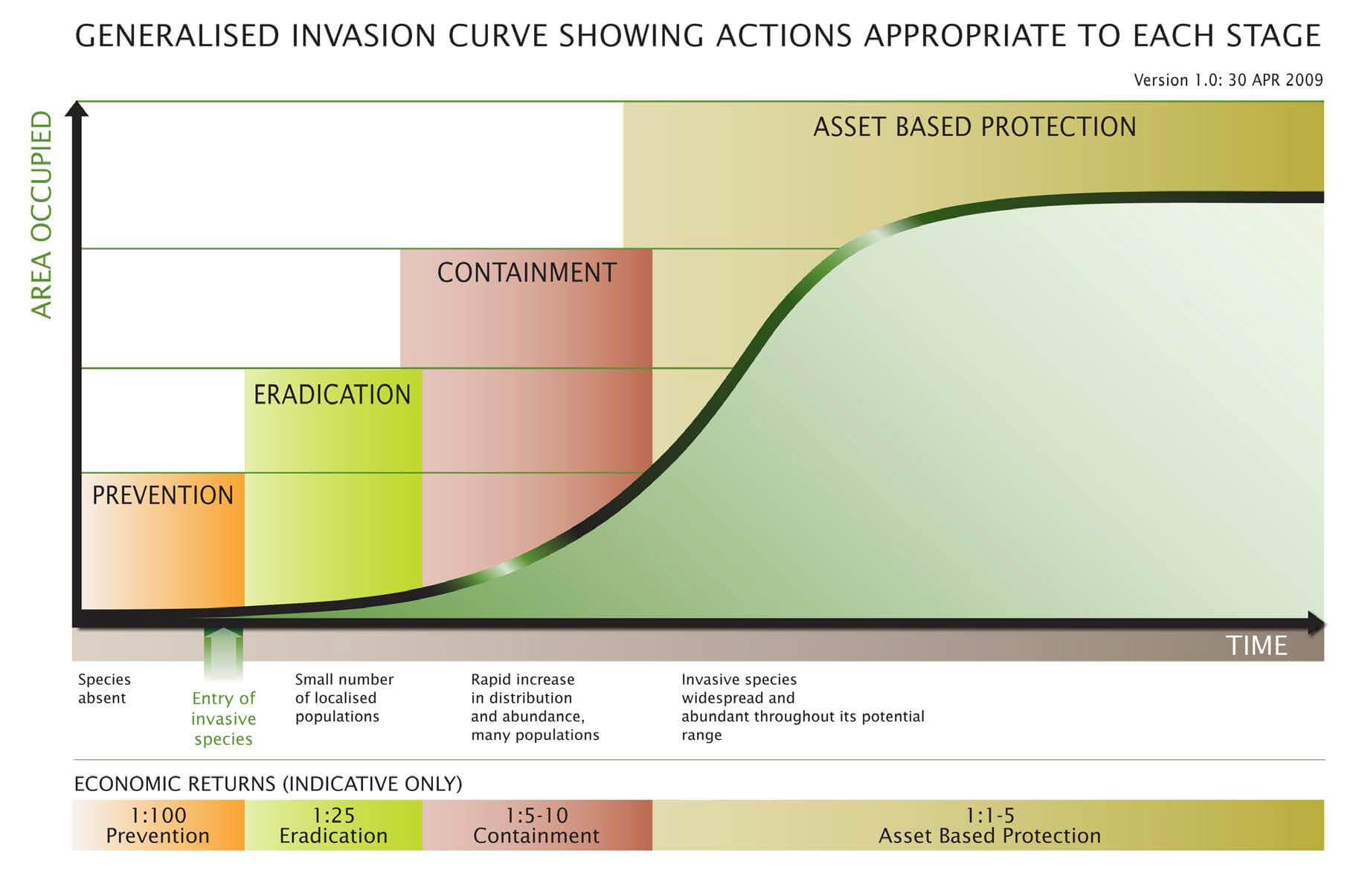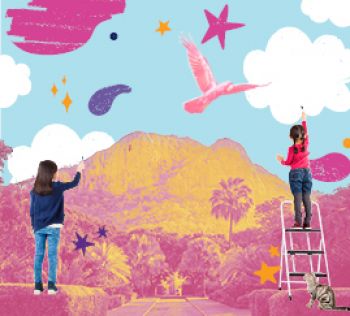Restricted Invasive Plants & Animals
Warning
Updated: 21 March 2025
Dingoes in Annandale and Douglas have exhibited aggression towards people. Avoid interactions with dingoes for the safety of you and your pets. Efforts are being implemented to mitigate the risk posed by these animals.
The Townsville Biosecurity Plan outlines Council's strategies for preventing the introduction, eradicating and containing restricted pest plants and animals in Townsville.
Feral horses
Feral horses are horses that are not owned and are wandering unmanaged. The purpose of managing feral horses in Townsville is to manage the risk to human life from large animals within road corridors.
In Townsville, feral horses have been located in the suburbs of Alligator Creek, Black River and Bluewater Park. Feral horses pose a road safety risk owing to their size and tendency to wander on road corridors. Feral horses also cause erosion, damage vegetation, spread weeds and effect graziers.
Any person that wishes to capture and rehome feral horses must have the permission of the landowner/occupier, and comply with all regulations, laws and humaneness codes such as the Animal Care and Protection Act 2001, National Livestock Identification System, and Subordinate Local Law No. 2 (Animal Management) 2011.
Best practice feral horse control can be found on the Pest Smart website.
For more information, download the Feral Horse Factsheet (PDF, 1.7 MB)
Dingoes and Wild Dogs
Dogs, wild dogs, feral dogs and dingoes: what's the difference?
- Wild dogs are all dogs that are not domesticated including dingoes, feral dogs and hybrids/crosses between the two.
- Dingoes are native Australian dogs believed to have migrated from South-East Asia about 5000 years ago and have a lasting natural impact on Australian native animals. Dingoes cannot be visually distinguished from dogs with domestic breed genes, some can only be identified by their genetic makeup. They generally breed once a year.
- Feral dogs are abandoned domestic dogs living in a wild state in the bush or in an urban environment.
- Domestic dogs are all dogs bred and kept as pets, guard dogs or working dogs. Domestic dogs that are not registered nor microchipped may be confused as feral dogs if they are free roaming, and display similar behaviour to that of a wild dog.
Impacts
- The availability of food and water resources linked to human settlement enables dingoes/wild dogs to increase in population. In rural environments, this is through water troughs, dams and stock, whilst in urban areas additional resources include irrigation, ponds, littered food scraps and even domestic pets. Increased numbers of wild dogs can also adversely impact native wildlife populations, of particular concern is rare, threatened, and endangered wildlife.
- In rural areas dingoes/wild dogs can reduce the viability of poultry, sheep, goat and cattle farming through bites reducing price at sale, and through cattle and calf losses.
- Dingoes/wild dogs can be a hazard to pets and, in some instances, humans, in urban, peri-urban and rural environments.
- Dingoes/wild dogs can carry both canine and human diseases including distemper, neosporosis, canine parvovirus and hydatid worms.
Townsville distribution
Widespread on mainland Townsville, including urban, peri-urban and rural areas. Magnetic Island has no known wild populations.
Useful Links
Townsville City Council
- Townsville City Biosecurity Plan 2020-2024 (PDF, 3.6 MB)
- Page 7 of Townsville City Biosecurity Plan 2020-2024 – Quick Reference Guide (PDF, 2.3 MB)
Queensland Government
- Dingo
- Wild Dog
- Controlling Pest Animals on your Property
- Invasive Animal Control Using Poisons
- Choosing the Right Wild Dog Control Methods
Pest Smart
YouTube
High Priority Weeds
These restricted plants are so widespread in Townsville that the management objective is to contain them to their existing extent. Eradication of these plats will form part of a long term strategy.
Townsville residents enjoy a great lifestyle supported by our natural environment. Pest plants are non-native species that can affect our lifestyle and cause environmental and economic harm.
Many of Townsville’s 23 high priority weeds are widespread or abundant, where asset based protection is appropriate action. Every situation is different, however decisions should be formed on a risk basis. For example, Chinee Apple impeding the view of drivers from other traffic is a higher priority for control than one growing in a vacant suburban allotment. The former has a risk to human life and property, whilst the latter is a nuisance.
Council’s pest management decisions are formed on a risk basis, in accordance with the Biosecurity Act 2014.
Useful Links
Townsville City Council
- Appendix 3 of Townsville City Biosecurity Plan 2020-2024 (PDF, 3.6 MB)
Business Queensland
High Priority Feral Animals
Townsville residents enjoy a great lifestyle supported by our natural environment. Feral animals are non-native species that can impact our lifestyle and cause environmental and economic harm.
- Feral cats are known as Australia’s worst feral animal, having been a main driver of native species extinction in Australia. Feral cats are a high priority in Townsville to reflect their pest status. Prioritisation of control is based on the impacts the pest is having or is likely to cause. Protection of environmental values in World Heritage Listed areas, such as Paluma and Magnetic Island, are considered higher priority than urban areas, where minor (nuisance) social impacts are felt. Environmental Health impacts are considered separately to biosecurity issues.
- Stray or wandering cats in urban areas are considered a social nuisance. Resident’s impacted by stray or wandering cats can catch the animals themselves on their own property, or engage a pest controller at their own cost. Cats can be handed in to the Townsville Animal Care and Adoption Centre.
- Feral pigs are one of the most notable pest of Townsville’s six high priority pests. Feral pigs are widespread in rural and peri-urban areas of mainland Townsville. Management of feral pigs in peri-urban properties can be challenging. Neighbours are encouraged to work together in order to effectively manage the impacts from feral pigs.
Useful Links
Business Queensland
Frequently Asked Questions
Who is responsible for managing weeds and pest animals?
All Queenslanders have a ‘general biosecurity obligation’ (GBO) under Queensland's Biosecurity Act 2014. This means that everyone is responsible for managing biosecurity risks that are under their control and that they know about, or should reasonably be expected to know about.
Under the GBO, individuals and organisations whose activities pose a biosecurity risk must:
- take all reasonable and practical steps to prevent or minimise the biosecurity risk
- eliminate or minimise the likelihood of causing a ‘biosecurity event’, and limit the consequences if such an event is caused
- prevent or minimise the harmful effects a risk could have, and not do anything that might make any harmful effects worse.
Useful Links
Department Agriculture and Fisheries
Do I need a permit to undertake control of pest animals on my property?
You do not need a permit to manage restricted invasive animals on your property, however some activities may require licensing or endorsement. For example, firearms require a Weapons Licence with the appropriate category relating to the category firearm you are using. If you are working on a property that is not your own, permission must be granted by the owner.
Is it illegal to target domestic animals in a pest control program?
My neighbour’s Leucaena keeps dropping seed into my yard – what can I do?
Maintaining or removing Leucaena seedlings is an ongoing task, and a particularly frustrating one when the parent trees are in a neighbouring property.
Whilst Leucaena is an environmental weed, it is neither a Restricted, nor a Prohibited invasive plant under the Biosecurity Act 2014. Queensland Civil and Administrative Tribunal deals with tree disputes, and details ways in which to deal with the matter.
Do I need a permit to clear vegetation on my property even if it is all weeds?
Depending on how your land is zoned you may need a permit from the Queensland Government to clear the land even if the vegetation is restricted invasive plants or “weeds”. Before any land clearing you should consult with the Queensland Government.
Notifying Council about Pests
Have you discovered a new weed or a new infestation of an existing weed? Seen a pest animal that you haven't noticed in Townsville before?
If so, complete our Pest Notification form. Once returned to Council either by email or in person at 103 Walker Street, we will follow up on your sighting.
Council Permits and Programs
Council holds the following Restricted Matter permit:
- Educational Use Permit (PDF, 109.8 KB)






